|
|
|
Sort Order |
|
|
|
Items / Page
|
|
|
|
|
|
|
| Srl | Item |
| 1 |
ID:
131882
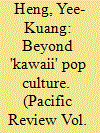

|
|
|
|
|
| Publication |
2014.
|
| Summary/Abstract |
Many studies of Japan's soft power are premised on the 'affective' dimensions of its kawaii pop culture that generate liking or interest. While entirely warranted, emphasising cultural attraction does not do sufficient justice to the multi-faceted foundations of Japanese soft power. Neither does it recognise other components of Joseph Nye's soft power framework stressing the 'normative' appeal of policies that reflect global norms. This article investigates the 'normative' dimensions of Japan's soft power on climate change, and whether it translates into international influence, as Nye predicted. The first section examines the Cabinet's 2010 New Growth Strategy, identifying a potential source of 'normative' soft power in its self-proclaimed desire to reinvent Japan as a 'trouble-shooting nation on global issues', specifically environmental challenges. Next, it analyses how Japanese entities (government, corporations, and NGOs) can transmit 'normative' soft power, and obstacles encountered. These transmission mechanisms include 'Cool Earth Partnership' programmes, the 'Future City Initiative' and the values-based Satoyama Initiative. The final section addresses conceptual implications that arise, and assesses whether Japan's 'normative' soft power has paid dividends. Drawing from literature on pioneer states and external reviews of Japan's alignment with key climate norms, the paper suggests that Japan's normative soft power is lacking in driving agendas at global climate forums. At a pragmatic problem-solving level, however, Japan is increasingly perceived as an attractive source of transferable solutions, reflecting climate norms such as developing eco-friendly technologies and providing assistance to help vulnerable countries mitigate climate change
|
|
|
|
|
|
|
|
|
|
|
|
|
|
|
|
| 2 |
ID:
077060
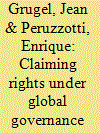

|
|
|
| 3 |
ID:
148398


|
|
|
|
|
| Summary/Abstract |
Examining the oil and gas industry in the Russian Arctic, this article investigates the gap between corporate social responsibility (CSR) as articulated in corporate offices and implemented at the local level. In Russia, global CSR norms interact with weak formal institutions and the strong informal expectations of state officials and local communities that companies bear responsibility for welfare and infrastructure. As a result, the concept of citizens as ‘stakeholders’ is underdeveloped. Instead, local residents remain subjects within a neo-paternalist system of governance that mimics some elements of the Soviet past. Compensation for damages to indigenous peoples has blurred legal obligations and the voluntary nature of CSR. However, the CSR in the region is constantly developing and formal methods of compensation may assist in clarifying the scope and practice of CSR.
|
|
|
|
|
|
|
|
|
|
|
|
|
|
|
|
| 4 |
ID:
155704
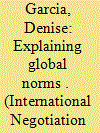

|
|
|
|
|
| Summary/Abstract |
International norms are central to world politics and they set boundaries for what is deemed commonly accepted behavior. The literature has not effectively explained the rise of new norms through negotiation and how actors from the Global South have played active roles, especially in the complex areas of developing security norms. This article argues that norm-making is not a unidirectional movement or phenomenon, but rather a highly circuitous process. The circuitous norm building model accounts for an increasing connectedness among domestic and regional/international levels in norm building in Global South and North countries.
|
|
|
|
|
|
|
|
|
|
|
|
|
|
|
|
| 5 |
ID:
116373


|
|
|
|
|
| Publication |
2012.
|
| Summary/Abstract |
Demographic shifts and increased migration, coupled with restrictive immigration and citizenship policies, have left Northeast Asian states ill equipped to confront the challenges of growing numbers of long-term sojourners. When the policy of a state that is resistant to immigration is at odds with the local reality, as is the case in Japan, local governments attempt to shape how people understand or make sense of a geographical area in ways that integrate foreign residents. The resulting contest over the "meaning of place" in Japan results in multicultural policies that highlight the importance of place. These policies, called tabunka kyosei (broadly understood as multiculturalism), have become an important part of discussions about diversity and difference in Japan, although the extent to which these policies will result in a more critical engagement with difference remains to be seen. This article offers an ethnography of Shijuku Ward's Okubo administrative area to illustrate how local governments skirt restrictive national immigration policies and instead draw from global norms of multiculturalism to create policies that manage the meaning of local places in ways that integrate foreign residents.
|
|
|
|
|
|
|
|
|
|
|
|
|
|
|
|
| 6 |
ID:
099610
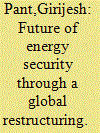

|
|
|
|
|
| Publication |
2010.
|
| Summary/Abstract |
The base and superstructure of the present energy regime are becoming unsustainable. With billions joining the energy market, supplies have to expand exponentially. The expansion of energy supplies from new sources becomes the necessary condition for global energy security. The scale of expansion required to construct a new global energy mix can only be accomplished through a global approach. It is a global question because the concerned stakeholders are located in different regions consisting of different globalising economies. Increasing integration and interdependence among the energy suppliers and consumers, and the location of the energy industry in the globalising market, has necessitated the redefinition of energy security both at the conceptual and policy level. The future of energy security has to be defined in terms of global energy systems and regime. A global restructuring of energy system would inevitably assume global engagement, global partnership and global norms and institutions.
|
|
|
|
|
|
|
|
|
|
|
|
|
|
|
|
| 7 |
ID:
093789
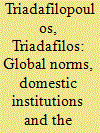

|
|
|
|
|
| Publication |
2010.
|
| Summary/Abstract |
This article examines the liberalisation of immigration policy in Canada and the US in the post-World War II era. I argue that shifting norms pertaining to race, ethnicity, and human rights cast longstanding discriminatory policies in Canada and the US in a highly critical light. Opponents of racially discriminatory immigration policies exploited this shift in normative contexts to highlight the disjuncture between Canada and the US' postwar commitments to liberal norms and human rights, on the one hand, and their extant policy regimes, on the other. The resulting pressure set in motion comparable processes of policy stretching and unravelling, which culminated in policy shifting in the mid-1960s. Policy shifting was, however, subject to very different political dynamics. Whereas Canada's institutional configuration granted the executive branch and bureaucracy a high degree of autonomy that enabled experimentation, the greater openness of the American political system led to a more politicised process, marked by compromises and deal-making. Thus while changing norms prompted the liberalisation of immigration policies in both countries, differences in their domestic political contexts resulted in very different admissions regimes.
|
|
|
|
|
|
|
|
|
|
|
|
|
|
|
|
| 8 |
ID:
164405


|
|
|
|
|
| Summary/Abstract |
The positive effects of rule of law norms and institutions are often assumed in the peacebuilding literature, with empirical work focusing more on processes of compliance with international standards in war-torn countries. Yet, this article contends that purportedly ‘good’ rule of law norms do not always deliver benign benefits but rather often have negative consequences that harm the very local constituents that peacebuilders promise to help. Specifically, the article argues that rule of law promotion in war-torn countries disproportionately favours actors who have been historically privileged by unequal socio-legal and economic structures at the expense of those whom peacebuilders claim to emancipate. By entrenching an inequitable state system which benefits those with wealth, education, and influence, rule of law institutions have reinforced structural, social, and cost-related barriers to justice. These negative effects explain why war-torn societies avoid the formal courts and law enforcement agencies despite substantial international efforts to professionalise and strengthen these institutions to meet global rule of law standards. The argument is drawn from an historical, comparative, and empirical analysis of the UK-funded justice sector development programme in Sierra Leone and US-supported rule of law reforms in Liberia – two postwar countries often cited as prototypes of successful peacebuilding.
|
|
|
|
|
|
|
|
|
|
|
|
|
|
|
|
| 9 |
ID:
109872


|
|
|
|
|
| Publication |
2012.
|
| Summary/Abstract |
For more than fifty years, the World Health Organization has helped monitor flu viruses and manufacture vaccines through the Global Influenza Surveillance Network (GISN). However, GISN became a flashpoint for conflict when Indonesia refused to share its samples of avian influenza until drugs and other benefits were shared in return. Years of controversial negotiations were required to agree on a framework for virus and benefit sharing, providing important insights into disease surveillance, global norms, and international law. First, this controversy suggests that surveillance behaves like a luxury good, which complicates the conventional wisdom that it is a global public good. Second, even well-established norms were not immune to challenge, thereby limiting the significance of 'tipping points' and 'normative cascades'. Finally, legal arguments were common in this controversy but equivocal and inconclusive, so international law is unlikely to affect important outcomes relating to outbreak response.
|
|
|
|
|
|
|
|
|
|
|
|
|
|
|
|
| 10 |
ID:
157543


|
|
|
|
|
| Summary/Abstract |
How are global norms translated into local contexts? I examine the translation of three rule-of-law norms in postconflict Guatemala: the UN Convention on the Rights of the Child, the right to access public information, and best practices for international rule-of-law commissions. These cases, I argue, do not fit established models for diffusion, such as those associated with standard bargaining approaches, norm socialization frameworks, and norm localization theory. Instead, rule-of-law promotion triggered domestic contestation and, subsequently, what I term an “interactive translation loop.” These processes changed the modes of interaction among rule-of-law promoters and how the norms ultimately translated into the Guatemalan context. I demonstrate that a critical variable, the precision of international norms, conditions the leeway available for such translations. To the extent that my framework travels to other cases, it offers an important corrective to established theories of how global norms translate into local contexts.
|
|
|
|
|
|
|
|
|
|
|
|
|
|
|
|
| 11 |
ID:
108077


|
|
|
|
|
| Publication |
2011.
|
| Summary/Abstract |
China's expanding role in peacekeeping opens up a new avenue for China to strengthen global peace operations and contribute to stability and security in Africa and other developing regions, raising the prospects for China to become even more integrated into the international community. Its evolving role in peacekeeping is underpinned by a combination of factors. Through increasing socialization and interaction with the international community, China has become more willing to accept global norms and to contribute to peace and stability. At the same time, participation in peacekeeping allows China to professionalize its armed forces, to test its power projection capabilities and to pursue its aspirations to become a major global power. Whether such cooperative behaviour will be reversed or sustained is still uncertain. As such, its definitive role in peacekeeping remains largely indeterminate and thus merits continued and more nuanced observation.
|
|
|
|
|
|
|
|
|
|
|
|
|
|
|
|
|
|
|
|
|